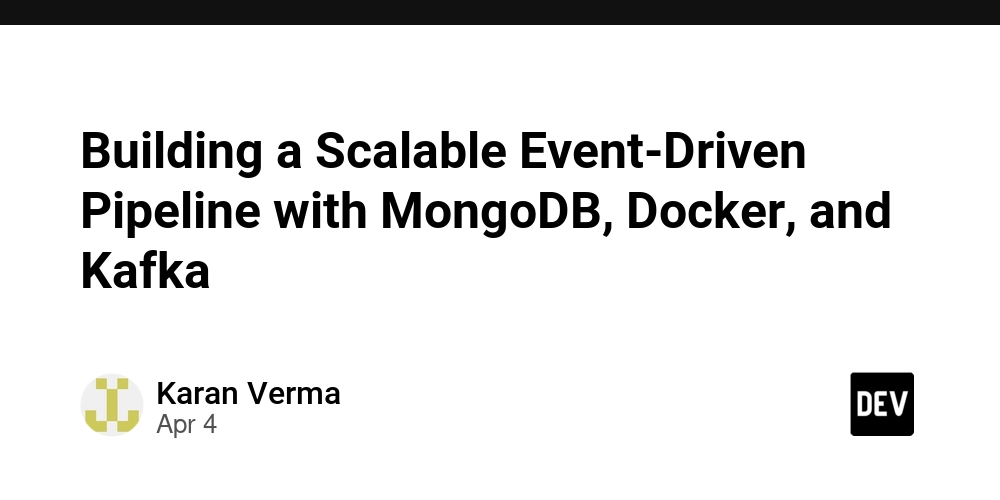Building a Scalable Event-Driven Pipeline with MongoDB, Docker, and Kafka
In modern DevOps workflows, handling real-time data streams efficiently is crucial for building scalable applications. In this guide, we'll explore how to set up an event-driven pipeline using MongoDB, Docker, and Kafka to handle high-throughput data processing with ease. Imagine an e-commerce platform processing millions of orders in real time. Our setup ensures seamless, fault-tolerant data streaming between services. 1. Why Event-Driven Architectures? Traditional architectures struggle with real-time processing, batch jobs, and scalability. Event-driven systems address these problems by: Decoupling components for greater scalability. Processing data in real-time instead of batch operations. Enhancing fault tolerance through asynchronous messaging. Kafka serves as the central message broker, while MongoDB acts as a persistent data store for event logs and structured data. 2. Setting Up MongoDB with Docker To run MongoDB in a containerized environment, use the following Docker Compose setup: version: '3.8' services: mongodb: image: mongo:latest container_name: mongodb restart: always ports: - "27017:27017" environment: MONGO_INITDB_ROOT_USERNAME: root MONGO_INITDB_ROOT_PASSWORD: example volumes: - mongodb_data:/data/db volumes: mongodb_data: Run MongoDB with: docker-compose up -d Now, MongoDB is up and running on port 27017. 3. Deploying Kafka in Docker Kafka requires Zookeeper for coordination. We'll deploy both using Docker Compose: services: zookeeper: image: confluentinc/cp-zookeeper:latest container_name: zookeeper environment: ZOOKEEPER_CLIENT_PORT: 2181 ports: - "2181:2181" kafka: image: confluentinc/cp-kafka:latest container_name: kafka depends_on: - zookeeper ports: - "9092:9092" environment: KAFKA_BROKER_ID: 1 KAFKA_ZOOKEEPER_CONNECT: zookeeper:2181 KAFKA_ADVERTISED_LISTENERS: PLAINTEXT://localhost:9092 Start Kafka with: docker-compose up -d Check Kafka logs to confirm it's running: docker logs -f kafka 4. Connecting Kafka & MongoDB Kafka Connect enables data streaming between Kafka and MongoDB. Step 1: Install MongoDB Kafka Connector docker exec -it kafka bash confluent-hub install mongodb/kafka-connect-mongodb:latest Step 2: Configure Kafka Connector Create a mongo-sink.json file: { "name": "mongo-sink-connector", "config": { "connector.class": "com.mongodb.kafka.connect.MongoSinkConnector", "topics": "events", "connection.uri": "mongodb://root:example@mongodb:27017", "database": "eventDB", "collection": "eventLogs" } } Apply the configuration: curl -X POST -H "Content-Type: application/json" --data @mongo-sink.json http://localhost:8083/connectors Now, Kafka will stream events directly into MongoDB!

In modern DevOps workflows, handling real-time data streams efficiently is crucial for building scalable applications. In this guide, we'll explore how to set up an event-driven pipeline using MongoDB, Docker, and Kafka to handle high-throughput data processing with ease.
Imagine an e-commerce platform processing millions of orders in real time. Our setup ensures seamless, fault-tolerant data streaming between services.
1. Why Event-Driven Architectures?
Traditional architectures struggle with real-time processing, batch jobs, and scalability. Event-driven systems address these problems by:
- Decoupling components for greater scalability.
- Processing data in real-time instead of batch operations.
- Enhancing fault tolerance through asynchronous messaging.
Kafka serves as the central message broker, while MongoDB acts as a persistent data store for event logs and structured data.
2. Setting Up MongoDB with Docker
To run MongoDB in a containerized environment, use the following Docker Compose setup:
version: '3.8'
services:
mongodb:
image: mongo:latest
container_name: mongodb
restart: always
ports:
- "27017:27017"
environment:
MONGO_INITDB_ROOT_USERNAME: root
MONGO_INITDB_ROOT_PASSWORD: example
volumes:
- mongodb_data:/data/db
volumes:
mongodb_data:
Run MongoDB with:
docker-compose up -d
Now, MongoDB is up and running on port 27017.
3. Deploying Kafka in Docker
Kafka requires Zookeeper for coordination. We'll deploy both using Docker Compose:
services:
zookeeper:
image: confluentinc/cp-zookeeper:latest
container_name: zookeeper
environment:
ZOOKEEPER_CLIENT_PORT: 2181
ports:
- "2181:2181"
kafka:
image: confluentinc/cp-kafka:latest
container_name: kafka
depends_on:
- zookeeper
ports:
- "9092:9092"
environment:
KAFKA_BROKER_ID: 1
KAFKA_ZOOKEEPER_CONNECT: zookeeper:2181
KAFKA_ADVERTISED_LISTENERS: PLAINTEXT://localhost:9092
Start Kafka with:
docker-compose up -d
Check Kafka logs to confirm it's running:
docker logs -f kafka
4. Connecting Kafka & MongoDB
Kafka Connect enables data streaming between Kafka and MongoDB.
Step 1: Install MongoDB Kafka Connector
docker exec -it kafka bash
confluent-hub install mongodb/kafka-connect-mongodb:latest
Step 2: Configure Kafka Connector
Create a mongo-sink.json file:
{
"name": "mongo-sink-connector",
"config": {
"connector.class": "com.mongodb.kafka.connect.MongoSinkConnector",
"topics": "events",
"connection.uri": "mongodb://root:example@mongodb:27017",
"database": "eventDB",
"collection": "eventLogs"
}
}
Apply the configuration:
curl -X POST -H "Content-Type: application/json" --data @mongo-sink.json http://localhost:8083/connectors
Now, Kafka will stream events directly into MongoDB!












































































































































































![[The AI Show Episode 142]: ChatGPT’s New Image Generator, Studio Ghibli Craze and Backlash, Gemini 2.5, OpenAI Academy, 4o Updates, Vibe Marketing & xAI Acquires X](https://www.marketingaiinstitute.com/hubfs/ep%20142%20cover.png)



























































































































![[DEALS] The Premium Learn to Code Certification Bundle (97% off) & Other Deals Up To 98% Off – Offers End Soon!](https://www.javacodegeeks.com/wp-content/uploads/2012/12/jcg-logo.jpg)


![From drop-out to software architect with Jason Lengstorf [Podcast #167]](https://cdn.hashnode.com/res/hashnode/image/upload/v1743796461357/f3d19cd7-e6f5-4d7c-8bfc-eb974bc8da68.png?#)









































































































.png?#)

































_Christophe_Coat_Alamy.jpg?#)
 (1).webp?#)




































































































![iPhone 17 Pro Won't Feature Two-Toned Back [Gurman]](https://www.iclarified.com/images/news/96944/96944/96944-640.jpg)
![Tariffs Threaten Apple's $999 iPhone Price Point in the U.S. [Gurman]](https://www.iclarified.com/images/news/96943/96943/96943-640.jpg)





































































































































